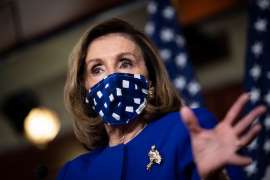By Natalie Andrews, Kristina Peterson, Wall Street Journal–
House Speaker Nancy Pelosi said Wednesday the coronavirus relief plan she has been discussing with the White House could morph in the lame-duck session of Congress, absent any formal agreement on its details and shifting incentives for both parties after the election.
“There’s very little that we have a commitment from them on. We have, shall we say, narrowed our differences,” the California Democrat said in an interview. The speaker last spoke with Treasury Secretary Steven Mnuchin on Monday. The two have been discussing a roughly $2 trillion package but have yet to finalize details, and both sides have acknowledged there is no time to pass legislation before election Tuesday.
President Trump has repeatedly said he would like to pass more coronavirus relief, including a second round of direct checks to Americans. Any deal this year would need to make it through the Republican-controlled Senate, where GOP lawmakers are divided on the level of assistance that is needed, if any. The new Congress and president take over in January.
“What [Mr. Mnuchin] and I have agreed upon—on how we would go forward—is not necessarily what the Republican Senate will vote on,” Mrs. Pelosi said. “That is up to the president to convince them that the agreement we have with him is one that will be honored by them.”
Spokespeople for the White House and Treasury Department didn’t immediately respond to a request for comment.
The stalled discussions devolved into finger-pointing last week as prospects for a deal before Election Day waned. After passing several bills earlier this year to address the health and economic needs caused by the coronavirus pandemic, Democrats and the administration have been at loggerheads since May. Points of disagreement, besides the overall price tag, included state and local aid, the size and duration of enhanced jobless benefits and liability shields for hospitals and businesses.
Vulnerable Democratic and Republican lawmakers pushed their leadership to come to the table in September and October, and discussions restarted but failed to result in an agreement before Election Day. Lawmakers aren’t expected to return to Washington until next month.
“We’ll come back in November,” Senate Appropriations Chairman Richard Shelby (R., Ala.) said Monday. “The question might be, will there be something then?”
Republicans have accused Democrats of holding out on a deal, saying it could politically benefit them. Democrats point to a roughly $3.5 trillion bill the House passed in May to address the pandemic, and a second, $2.2 trillion bill passed earlier this month, neither of which were taken up in the Senate. GOP senators attempted to pass their own “skinny” bills, but were blocked by Democrats.
“The political calculation from the Democrats is to make sure that no deal is struck, because that could be perceived as helping the president and Senate Republicans,” said Republican Sen. Shelley Moore Capito of West Virginia.
Many lawmakers have been downbeat on the prospects of reaching an agreement on a sweeping coronavirus aid package during the lame-duck session, when the levers of power are expected to shift and the incentive to reach a deal to show to voters evaporates.
Democrats may have incentive to make compromises on a coronavirus relief package if their leverage is about to dramatically increase in 2021 from winning the White House and seizing back control of the Senate.
Democrats are currently expected to maintain and possibly expand their majority in the House, according to nonpartisan election watchers, while control of the Senate is seen as up for grabs. Mr. Trump trails Democrat Joe Biden in national polls, and in some surveys of battlegrounds states he won in 2016. The president says the polls are understating his strength.
Mrs. Pelosi said Democrats still wanted to reach an agreement during the lame-duck period, but she also acknowledged that negotiations would be different if Democrats have full control of the government next year.
“It’s certainly night-and-day in terms of negotiating an agreement in 2021 if we have the White House, the Senate and the House,” she said. “We’re motivated by meeting the needs of the American people and doing so as expeditiously as possible.”
Write to Natalie Andrews at Natalie.Andrews@wsj.com and Kristina Peterson at kristina.peterson@wsj.com


Leave A Comment
You must be logged in to post a comment.